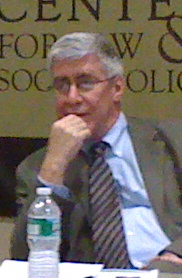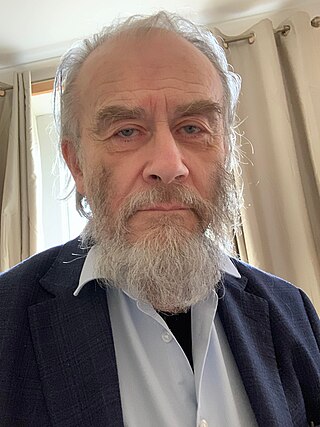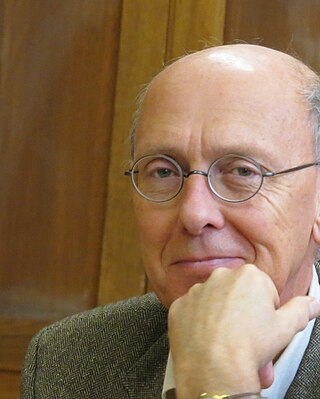
Jurisprudence is the philosophy and theory of law. It is concerned primarily with both what the law is and what it ought to be. That includes questions of how persons and social relations are understood in legal terms, and of the values in and of law. Work that is counted as jurisprudence is mostly philosophical, but it includes work that also belongs to other disciplines, such as sociology, history, politics and economics.

Christine Marion Korsgaard, is an American philosopher who is the Arthur Kingsley Porter Professor of Philosophy Emerita at Harvard University. Her main scholarly interests are in moral philosophy and its history; the relation of issues in moral philosophy to issues in metaphysics, the philosophy of mind, and the theory of personal identity; the theory of personal relationships; and in normativity in general.

John Leslie Mackie was an Australian philosopher. He made significant contributions to ethics, the philosophy of religion, metaphysics, and the philosophy of language. Mackie had influential views on metaethics, including his defence of moral scepticism and his sophisticated defence of atheism. He wrote six books. His most widely known, Ethics: Inventing Right and Wrong (1977), opens by boldly stating, "There are no objective values." It goes on to argue that because of this, ethics must be invented rather than discovered.

Ronald Myles Dworkin was an American legal philosopher, jurist, and scholar of United States constitutional law. At the time of his death, he was Frank Henry Sommer Professor of Law and Philosophy at New York University and Professor of Jurisprudence at University College London. Dworkin had taught previously at Yale Law School and the University of Oxford, where he was the Professor of Jurisprudence, successor to philosopher H. L. A. Hart.

Rosalind Hursthouse is a British-born New Zealand moral philosopher noted for her work on virtue ethics. She is one of the leading exponents of contemporary virtue ethics, though she has also written extensively on philosophy of action, history of philosophy, moral psychology, and biomedical ethics. Hursthouse is Professor Emerita of Philosophy at the University of Auckland and Fellow of the Royal Society of New Zealand.

Herbert Lionel Adolphus Hart was an English legal philosopher. He was the Professor of Jurisprudence at Oxford University and the Principal of Brasenose College, Oxford. His most famous work is The Concept of Law, which has been hailed as "the most important work of legal philosophy written in the twentieth century". He is considered one of the world's foremost legal philosophers in the twentieth century.

John Gardner was a Scottish legal philosopher. He was senior research fellow at All Souls College, Oxford, and prior to that the Professor of Jurisprudence at the University of Oxford and a fellow of University College, Oxford.

Jeremy Waldron is a New Zealander legal philosopher. He holds a University Professorship at the New York University School of Law, is affiliated with the New York University Department of Philosophy, and was formerly the Chichele Professor of Social and Political Theory at All Souls College, Oxford University. Waldron also holds an adjunct professorship at Victoria University of Wellington. Waldron is regarded as one of the world's leading legal and political philosophers.

John Mitchell Finnis is an Australian legal philosopher and jurist specializing in jurisprudence and the philosophy of law. He is an original interpreter of Aristotle and Aquinas, and counts Germain Grisez as a major influence and collaborator. He has made contributions to epistemology, metaphysics, and moral philosophy.

Judith Jarvis Thomson was an American philosopher who studied and worked on ethics and metaphysics. Her work ranges across a variety of fields, but she is most known for her work regarding the thought experiment titled the trolley problem and her writings on abortion. She is credited with naming, developing, and initiating the extensive literature on the trolley problem first posed by Philippa Foot which has found a wide range use since. Thomson also published a paper titled "A Defense of Abortion", which makes the argument that the procedure is morally permissible even if it is assumed that a fetus is a person with a right to life. She was elected a member of the American Philosophical Society in 2019.

Joseph Raz was an Israeli legal, moral and political philosopher. He was an advocate of legal positivism and is known for his conception of perfectionist liberalism. Raz spent most of his career as a professor of philosophy of law at Balliol College, Oxford, and was latterly a part-time professor of law at Columbia University Law School and a part-time professor at King's College London. He received the Tang Prize in Rule of Law in 2018.

Stephen Richard Lyster Clark is an English philosopher and professor emeritus of philosophy at the University of Liverpool. Clark specialises in the philosophy of religion and animal rights, writing from a philosophical position that might broadly be described as Christian Platonist. He is the author of twenty books, including The Moral Status of Animals (1977), The Nature of the Beast (1982), Animals and Their Moral Standing (1997), G.K. Chesterton (2006), Philosophical Futures (2011), and Ancient Mediterranean Philosophy (2012), as well as 77 scholarly articles, and chapters in another 109 books. He is a former editor-in-chief of the Journal of Applied Philosophy (1990–2001).
The White's Chair of Moral Philosophy was endowed in 1621 by Thomas White, Canon of Christ Church as the oldest professorial post in philosophy at the University of Oxford.
Leslie John Green is a Scottish-Canadian legal scholar specialising in jurisprudence. He is Professor of the Philosophy of Law and Fellow of Balliol College, Oxford University, and Professor of Law and Distinguished Faculty Fellow at Queen's University, Kingston. A legal positivist, his research also focuses on political philosophy and constitutional theory.

Jonathan Peter Dancy is a British philosopher, who has written on ethics and epistemology. He is currently Professor of Philosophy at University of Texas at Austin and Research Professor at the University of Reading. He taught previously for many years at the University of Keele.

James Opie Urmson was a philosopher and classicist who spent most of his professional career at Corpus Christi College, Oxford. He was a prolific author and expert on a number of topics including British analytic/linguistic philosophy, George Berkeley, ethics, and Greek philosophy.
James Patrick Griffin was an American-born philosopher, who was White's Professor of Moral Philosophy at the University of Oxford from 1996 to 2019.
Matthew Henry Kramer is an American philosopher, and is currently a Professor of Legal and Political Philosophy at the University of Cambridge and a Fellow of Churchill College, Cambridge. He writes mainly in the areas of metaethics, normative ethics, legal philosophy, and political philosophy. He is a leading proponent of legal positivism. He has been Director of the Cambridge Forum for Legal and Political Philosophy since 2000. He has been teaching at Cambridge University and at Churchill College since 1994.
Nigel Simmonds is Emeritus Professor of Jurisprudence at the University of Cambridge and former Dean of College at Corpus Christi College, Cambridge.

Barbara Herman is the Griffin Professor of Philosophy and Professor of Law at the University of California, Los Angeles Department of Philosophy. A well-known interpreter of Kant's ethics, Herman works on moral philosophy, the history of ethics, and social and political philosophy. Among her many honors and awards include a Guggenheim Fellowship (1985-1986) and election to the American Academy of Arts & Sciences (1995).














